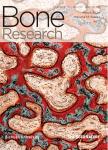Role and Mechanisms of Actions of Thyroid Hormone on the Skeletal Development
Role and Mechanisms of Actions of Thyroid Hormone on the Skeletal Development作者机构:Musculoskeletal Disease CenterLoma Linda VA HealthCare System Departments of MedicineLoma Linda University Division of EndocrinologyDepartment of Internal MedicineWonkwang University Sanbon Hospital
出 版 物:《Bone Research》 (骨研究(英文版))
年 卷 期:2013年第1卷第2期
页 面:146-161页
核心收录:
学科分类:1002[医学-临床医学] 100210[医学-外科学(含:普外、骨外、泌尿外、胸心外、神外、整形、烧伤、野战外)] 10[医学]
主 题:thyroid hormone bone cartilage growth factors bone cells
摘 要:The importance of the thyroid hormone axis in the regulation of skeletal growth and maintenance has been well established from clinical studies involving patients with mutations in proteins that regulate synthesis and/or actions of thyroid hormone. Data from genetic mouse models involving disruption and overexpression of components of the thyroid hormone axis also provide direct support for a key role for thyroid hormone in the regulation of bone metabolism. Thyroid hormone regulates proliferation and/or differentiated actions of multiple cell types in bone including chondrocytes, osteoblasts and osteoclasts. Thyroid hormone effects on the target cells are mediated via ligand-inducible nuclear receptors/transcription factors, thyroid hormone receptor (TR) a and ~, of which TRa seems to be critically important in regulating bone cell functions. In terms of mechanisms for thyroid hormone action, studies suggest that thyroid hormone regulates a number of key growth factor signaling pathways including insulin-like growth factor-I, parathyroid hormone related protein, fibroblast growth factor, Indian hedgehog and Wnt to influence skeletal growth. In this review we describe findings from various genetic mouse models and clinical mutations of thyroid hormone signaling related mutations in humans that pertain to the role and mechanism of action of thyroid hormone in the regulation of skeletal growth and maintenance.



